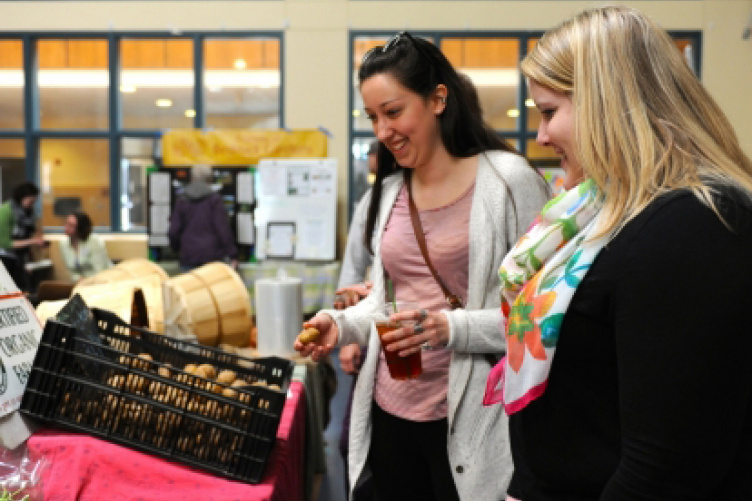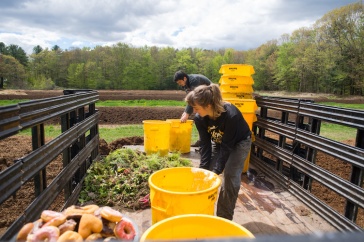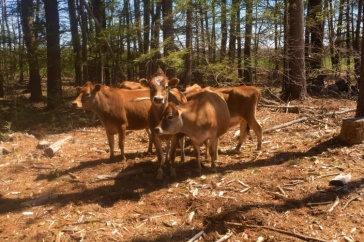
Sydney Howard '17 and Sierra Eugley '15 check out the young potatoes at the winter farmer's market held recently at Exeter High School.
In 2007, the word of the year in the Oxford American Dictionary was locavore. Kelly Cullen, associate professor of natural resources and the environment, did the lexicon one better this semester by teaching students how to be one.
“We start with terrifying statistics and end with hope,” Cullen says of the class that is educating students on the benefits of eating local. It is a movement that has been getting a lot of ink in recent years as people strive to buy food grown or produced within a certain distance from where they live. (While there is no universal food-miles standard, a range of 100 to 200 miles is often used.)
Alongside the scary statistics, such as those showing the nutritional value in many common crops has declined as much as 40 percent, and that the incidence of diabetes has nearly doubled in the last 10 years, are the benefits of being a locavore. Cullen ticks off the pluses: food security, supporting local economies and cultural heritage, fair conditions for workers and livestock, reduced reliance on petroleum, and the big one: knowing the source of the food you eat.
“By shopping local, you ‘meet the farmer,’” Cullen says. “You know where your food comes from. And it’s fresh. You can taste the difference.”
Sierra Eugley '15 grew up knowing that most of her food came from her hometown of Bremen, Maine, where her fisherman grandfather had a farm. Her father is also a fisherman.
|
Students in professor Kelly Cullen's "Being A Locavore" course plan their argument for eating local during a class debate that presented both sides of the movement. |
“I was eating local without knowing that’s what I was doing,” says Eugley, a tourism planning and development major. “It was all I knew. Now that I’m taking this class, I can really appreciate it.
“It’s actually changed the way I’ve been eating. When I’m at the grocery store, I don’t look at the prices anymore, I look at the quality.”
Sydney Howard '17 says the course has changed her thinking, too.
“One of the things I’ve realized is that unless people make a conscious decision to eat local, it won’t happen,” the animal science major says. “I think most people know it would be healthier and better for the environment to eat local but it’s hard to change. It takes effort.”
To that end, Cullen started the semester asking students to keep a food journal for one week, recording what they ate and where the food came from. They then looked at the food groups to see what is in season in New Hamsphire (or their home state) throughout the year so they could plan a 12-month menu.
“At the grocery store it’s forever summer,” Cullen says. “We’ve lost the ability to eat in season. I’m trying to show students that it’s possible.”
And she challenges the notion that it takes money to eat locally by teaching students the basics of canning and cheese making. For sophomores Griffin Sinclair-Wingate and Katie Levine, and senior Sarah Young, the concepts were eye-opening. The three admitted it hadn’t occurred to them that they could extend the seasons of what they eat through preserving. And all said money has influenced their food habits.
“My boyfriend is a hunter and I fish, so I’ve always been into eating local but when I’d go grocery shopping, I’d buy what was cheap.” says Levine, an environmental and resources economic major. “Now I’m okay with spending money.”
Adds Young, “Most of us don’t put food as a priority — we spend our money on other things first. I used to feel badly spending money on food. I don’t anymore.”
In addition to canning, Cullen introduces students to community-supported agriculture, a local model of food distribution that may, for a fee, have people sharing the crops from a particular farm. She also talks about gleaning, the reaping of misshapen squash or dented pumpkins, for example, that don’t meet market standards. It’s a way to use what otherwise goes to waste.
All of which has – literally – given students food for thought.
“I used to think I knew a lot about what I should eat,” says Sinclair-Wingate, an environmental and resources economic major. “I gave up meat a year ago but since taking this class, I’ve given up certain other foods, too. And if I don’t buy local, I try to buy organic. I’m definitely thinking more about what I eat.”
Young agrees, saying, “This class has taken thoughts that I’ve had in the back of my mind and moved them to the front.”
Related:
In the Classroom: Health Care in America
In the Classroom: Big Lessons of the Big Easy

















































